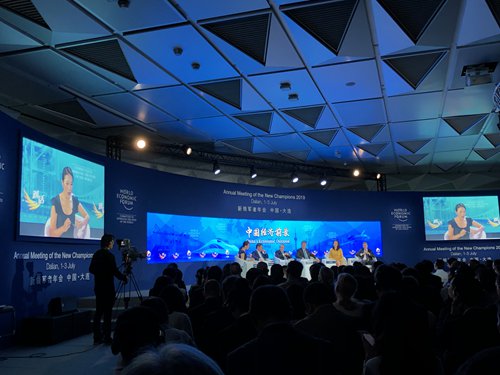HOME >> BUSINESS
AI talent rare as artists: Davos global leader
By Chu Daye in Dalian Source:Global Times Published: 2019/7/1 19:08:39

A session of the WEF's Annual Meeting of the New Champions 2019 Photo: Chu Daye/GT
Algorithm engineers are as rare as artists, badly needed by every industry, and becoming one is a lengthy process requiring dedication and hands-on experience to attain proficiency, a Davos Young Global Leader told the Global Times.
Reports have said that China needs millions of artificial intelligence (AI) engineers, while industry leaders worry that Chinese colleges are not doing enough to cultivate such talent.
Gong Rujing, World Economic Forum (WEF) Young Global Leader for 2019 and chairperson and founder of Happy Life Technology (HLT), said in the medical and healthcare scenario for AI applications, the requirement for talent is high.
"They must be proficient in their field of expertise; also, they must possess cross-disciplinary capability so that they can work seamlessly with surgeons and other medical staff," Gong told the Global Times on the sidelines of the WEF's Annual Meeting of the New Champions 2019 in Dalian, Northeast China's Liaoning Province.
HLT is a Chinese company that focuses on AI-driven healthcare solutions.
"Medical science is also extremely time-consuming, so patience and dedication are needed for AI experts, who can easily find other high-paying jobs," Gong said.
Companies like HLT try to merge China's relative lead in the AI field - given the country's population base and talent pool - with the medical sector, which has been seeking a transformation to a research- and innovation-driven model.
China wants to raise its average life expectancy to 77.3 years by 2020 and 79 by 2030, up from 76.34 in 2015, according to a plan on health development spanning the next 15 years.
It is difficult to reach a general conclusion on how AI can perform in the varied world of medicine, but Gong revealed that by harnessing the power of AI, the clinical development cycle for one particular drug being developed at one Chinese company was reduced to one-fourth of its original length.
In the long term, AI will reduce costs for research into drugs and treatment to a level where medical services can be provided to more people at a lower cost.
Market intelligence provider IDC said in a May 20 report that cloud-computing and AI empowering are the drivers of China's new-type medical and healthcare services.
AI on cloud platforms, virtual reality and robotics will be applied in a wide range of scenarios from long-distance surgery and recuperation to drug research and health management, according to IDC.
It's vital that AI is used to help Chinese research efforts to develop branded drugs.
"Foreign drug producers don't take the initiative to develop drugs that address Chinese-specific diseases," Gong said.
Posted in: COMPANIES